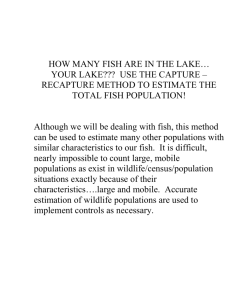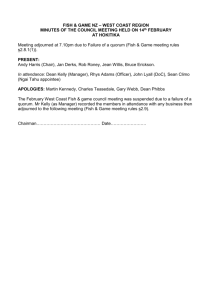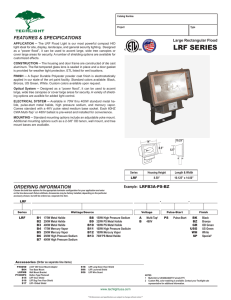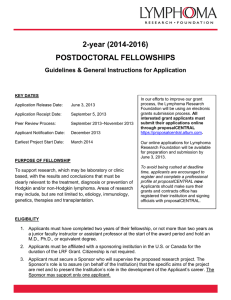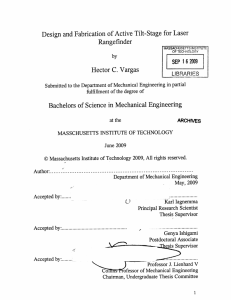An NGO perspective: A multi-sector, multi stakeholder
advertisement
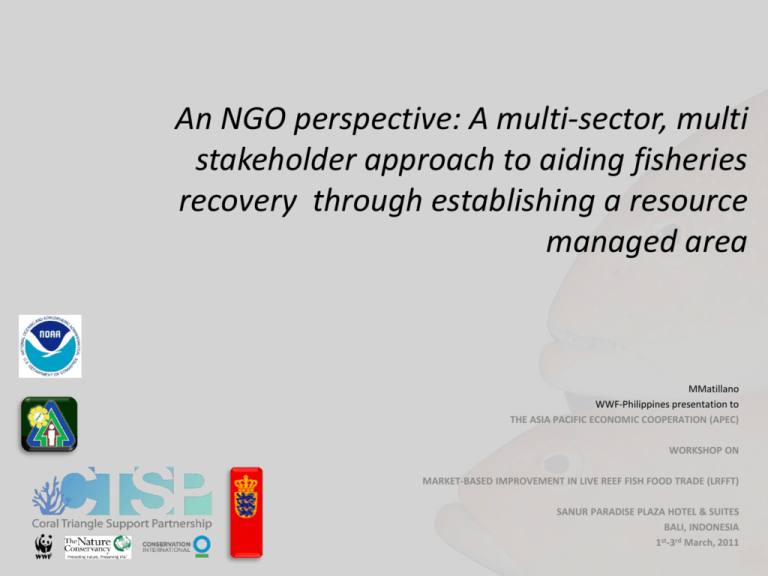
An NGO perspective: A multi-sector, multi stakeholder approach to aiding fisheries recovery through establishing a resource managed area MMatillano WWF-Philippines presentation to THE ASIA PACIFIC ECONOMIC COOPERATION (APEC) WORKSHOP ON MARKET-BASED IMPROVEMENT IN LIVE REEF FISH FOOD TRADE (LRFFT) SANUR PARADISE PLAZA HOTEL & SUITES BALI, INDONESIA st 1 -3rd March, 2011 Presentation Outline • • • • • Title Overview Stakeholders Sectoral perspective on LRF sustainability The role of WWF KEY PLAYERS AND STAKEHOLDERS Provincial Government Line Agencies from National Government LGU’s PCSD/S TRADERS’ GROUP (PALIFTA / KAWIL) Private establishments / resorts FARMC’s and Fisherfolks NGO’s Academe Sectoral perspective ACADEME: science and sustainability; have technical knowledge but usually do not have the logistical capacity and the official mandate to intervene / implement conservation measures GOV’t/LGU/PCSD: Regulations, livelihood, and constituency; have the official mandate and logistical capacity but authority is limited to within the municipal waters NGO: SRU. perspective cover trans-municipal concerns along with provincial institutions and have the capacity to provide technical and logistical leverage. Do not have official mandate to implement regulatory measures INDUSTRY: livelihood and income; conservation actions are voluntary by nature WWF Current initiatives in support of LRFF sustainability in Palawan • • • • Coral Triangle Support Program (Province-wide) Coral Triangle Network Initiative (Taytay) Live Reef Food Fish Sustainability (Quezon) Tubbataha MPA (Cagayancillo) LRFFS Support projects and Sites in Palawan LRFT cluster LRFT exploratory MPA effectiveness EAFM Expansion Area LOCATION TAYTAY BAY PALAWAN Intervention outline 1. Baseline Data Gathering and Review of Existing efforts • Existing policies and current practices / systems re LRFF sector • Scientific and socioeconomic assessments • Environmental Law Enforcement Capability Index • Gaps identification 2. Sustainability Planning • Presentation and validation of study results • Community and LGU meetings • Planning workshops 3. Policy enhancement / development – LRF ‘Chain of Custody” and Value Chain Analysis – Incorporation of LRF Sustainability Plan to the Comprehensive Municipal Fishery Ordinance of Taytay – Annual Revenue Projection in support of AIP – Mapping and demarcation of proposed MPAs Mapped sites Proposed MPAs / Sanctuaries Existing MPAs / Sanctuaries Seaweeds and fish cages Marine lease concession Taytay Bay municipal waters Area (hectares) 3,924.89 18,645.05 9,831.84 13,647.35 196,862.02 Projected Annual Revenue from Fishery Sector based on Studies and Existing Policies Volume / Quantity / Area per 2009 Unit Amount inventory (minimum) Item Details Rental Fee / Seaweeds / Fish Cage User Fees / Fish Corral 9,831,200 sqm Regulatory Fees Auxilliary Invoice Pearl Farms Fishing Boat Registration Fisherfolk Registration Fishing Gear Registration total amount per year 9,831,200.00 1,616 units Php.10/sqm 700.00 per hectare per year Php640/boat/ year 2,622 pax Php25/FF/year 65,550.00 1,629 units 337,153.800 kgs per month x 12 months 40,950 kg 17,830 kg Php75./FG/yr 122,175.00 136,473.500 has Fresh Fish Live Fish (suno) Live fish (loba) total projected revenue assumption: 20% collection efficiency Php.50/kg Php10/kg Php5./kg 9,553,145.00 1,034,240.00 2,022,918.00 409,500.00 89,150.00 23,127,878.00 4,625,575.60 Way Forward 1. Stakeholders Capability Building: – – – – • • Fish Examiners Training Paralegal Training FARMC Strengthening Local Scientists training / mentoring CC Adaptation Plan for Taytay Bay Policy Development Way Forward 2. Technical assistance to address concerns on transboundary fishing grounds for LRF 21 kms Way Forward 3. Technical assistance to LGU to address concerns re submerged and sustenance fish cager Fast Facts: • sustenance cagers comprise 66% of total # of LRF cagers in 2008; expected to increase by 2010 •Catches (intentionally and non-intentionally) undersized groupers for fattening in grow-out cages •Submerged to depths of 20 or more meters; uses hookah for maintenance and are hard to monitor Sample site: PALY ISLAND, TAYTAY year LRF cages LRF cagers 2008 408 225 2010 1,116 360 Way Forward 4. Research – 1-year study in the determination of CPUE, fecundity and spawning seasonality of P. leopardus in Quezon and Taytay. (on-going) – Database enhancement (bio-physical, socioeconomic-cultural) Thank you!


